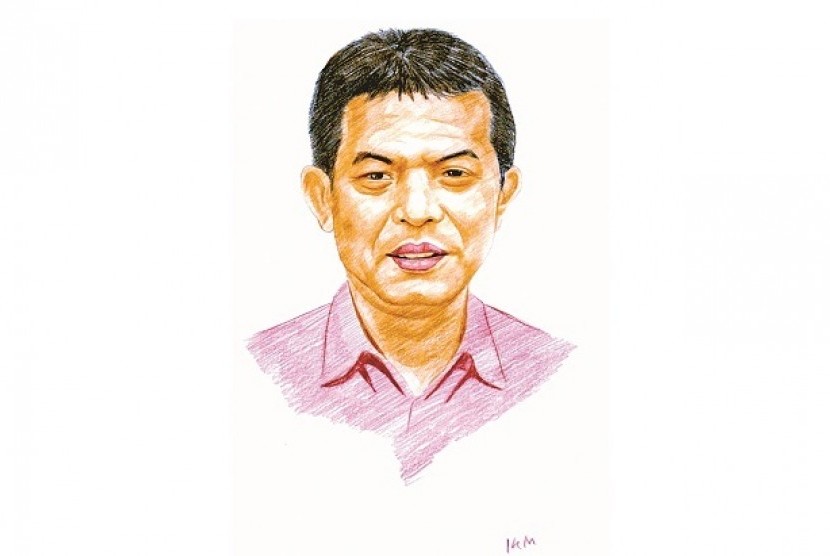REPUBLIKA.CO.ID, By Ikhwanul Kiram Mashuri
'From Russia with Love'; this was the title of a James Bond movie released in 1963. The movie was a continuation and the second series of 'Dr No'. Both the espionage genre film adapted from Ian Fleming's novel of the same title. The star of both movies acted by Sean Connery; as James Bond and as a secret agent 007.
Released in Cold War era between the West Block (US) and Eastern Bloc (Soviet Union), the box office movie was shot in the city of Istanbul, Turkey, revolved around the world of espionage and intelligence, completed with tapping activities and suspenseful scenes. James Bond acted as an invincible super spy. He was surrounded by beautiful women, known as the Bond Girls.
This film is now become a reference by number of media and Arab observers related with the growing Russian influence in the Middle East region. It is unclear of what was the relationship between 'From Russia with Love' with political developments in Middle East. Perhaps due to volatility of Middle East, they - a number of regimes that wants to maintain the rule - required sophisticated secret agents like James Bond, in order to spy on political opponents, both at home and abroad.
Russia's growing influence was marked by the visit of two ministers simultaneously to Egypt two weeks ago. Media in Arabic describing the visit as 'Min Rusiya ma'al Hubb' or 'Al-hubb min Rusiya' , which was nothing but the 'From Russia with Love'.
The two ministers were Foreign Minister Sergei Lavrov and Defense Minister Sergei Shoigu. During their Egypt visit, they met Egyptian Defense Minister Gen. Abdul Fattah Al Sisi and Foreign Minister Nabil Fahmy.
A number of Arab observers assessed positively the second visit of the Russian high-ranking officials.
"The Russians have come back (Al Rus Qodimun)," the title of Abdulrrahman Al Rashid article. "The Return of the Russian Red Bear" (Audatu Al-Dubb Al Rusy)," wrote Abdul Moneim Sa'id. "The Russians were returned (Al Rus Ya'udun)," Ali Salim said. All the trio was columnist of Al Sharq Al Awsat, a Saudi Arabia's daily published from London.
Egyptian newspaper Al Wafd looked that the visit of high officials as a 'historical' event and very 'important'. It's historic because it was Russia's first high-level visit to Egypt in recent decades. In 1972, a year before the Israeli military defeat, the late President Anwar Sadat expelled thousands of military advisers and experts from the Soviet Union. Since then Egypt was oriented to Washington.
The visit was also considered important because Egypt was in need of help and support of a large country like Russia. Especially after US halt aid to Egypt amounted to 1.3 billion dollars in October. US considered new Egyptian government has violated human rights and democratic principles, related to the military coup and violence against supporters of ousted President Mursi. Reportedly, the visit of two Russian officials has produced commitment of investment contracts and arms purchases worth 4 billion USD.
Unlike the US, Russian aid was without any pre-conditions. Russia did not question their foreign counterparts about democracy, human rights, or any political ideology. Since the collapse of the Soviet Union, followed by the fall of Berlin Wall, Russian interests in dealing with other countries can be attributed only on economic and security cooperation.
It's not known whether the visits to Egypt will change the political map in the Middle East. For example, Egypt joined the Iranian-Syrian axis, which has been close to Russia. Clearly, the US and Russia today was competing for influence in the political arena in the world. For Kremlin and White House, other countries might have been like cakes that should be contested. That struggle was ultimately produced trading, weapons, and other economic transactions.
Granting asylum to Edward Snowden by Russia should be read as a struggle for influence. Currently Snowden is the number one most wanted person for White House for leaking wiretaps activities committed by US and Australia to a number of countries, including Indonesia. Related to the struggle of world influence, President Obama has urged the US Congress not to issue new sanctions against Iran. He preferred settlement of the Iranian nuclear issue with negotiations and diplomacy.
Previously, Obama had spoken with the President of Iran, Hassan Rouhani, via phone when the latter was attending the UN General Assembly in New York in last September. This talk was the first since the two countries broke off diplomatic relations in 1979, following the victory of the Islamic Revolution in Iran.
Obama's move would upset the Israeli Prime Minister, Benjamin Netanyahu, who had several times wanted to attack centers of Iran's nuclear reactors. Netanyahu's disappointment was immediately addressed by Russian President, Vladimir Putin. The latter then happily host Netanyahu's visit to Moscow.
Previously, also in a bid to establish the influence in the Middle East, Russia -along with China- has twice vetoed a draft UN Security Council resolution condemning the violence by the regime of President Basar Assad's forces against civilians. President Putin also has successfully thwarted US plans and some of its allies to attack the bases of Assad power, while Syrian regime used chemical weapons against its people.
Political map of the world today is being changed. Interstate relations were no longer based on political ideology as it did in the Cold War period. US push for democratization of the countries of the world turned out to be a major supporter of the ruling monarch; a power inherited from generation to generation, such as in the Gulf countries, Jordan, and others.
While Russia and China were both no longer ' impose 'socialist and communist systems' to other countries. Its international relation and the struggle for influence were now based on economic interests and defense/security. And, in a changing world like this, it might be required a sophisticated secret agent like James Bond.
Ed: Heri Ruslan


